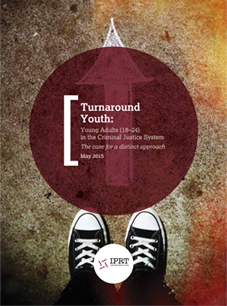Turnaround Youth: Young Adults (18-24) in the Criminal Justice System
12th May 2015
 This IPRT report presents the case for the differential treatment of young adults aged 18-24 who come in contact with the criminal justice system, and is grounded in emerging evidence, best practice, and informed by input from young people with experience of the issues.
This IPRT report presents the case for the differential treatment of young adults aged 18-24 who come in contact with the criminal justice system, and is grounded in emerging evidence, best practice, and informed by input from young people with experience of the issues.
This report gathers together the significant existing body of international research that demonstrates that several factors place young adults more at risk of becoming involved in offending behaviour and make the prison system an inappropriate and counterproductive means of dealing with young adults.
Key findings in the report:
- Young adults are more amenable to rehabilitation and change than older adults who commit the same crimes;
- The brain and maturity continue to develop beyond adolescence and into one’s mid-twenties – the right interventions can support desistance but the wrong interventions can deepen offending behaviour;
- Young adults aged 18-24 are disproportionately represented in the prison population: 20% of prison population compared with 9% of general population;
- Young adults aged 18-24s have highest rates of reoffending on release from prison (68% compared with 53%)
- Interventions and good practice that have proven successful in the youth justice system should be extended to young adults aged 18-24;
- Supervised bail support, diversion programmes, intensive community orders, and restorative justice practices are among the more effective responses to crimes committed by young adults.
Turnaround Youth: Young Adults (18-24) in the Criminal Justice System - the case for a distinct approach can be downloaded here.




